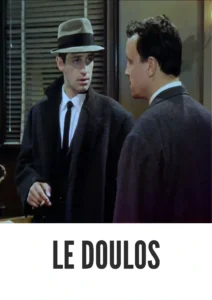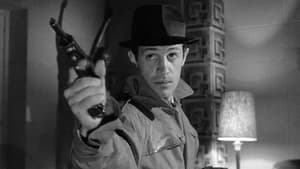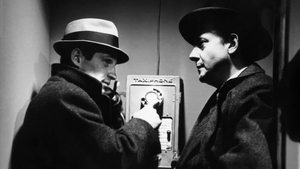Video Sources 0 Views

Synopsis

Experience the gritty and morally ambiguous world of French crime cinema with Le Doulos, a 1962 masterpiece directed by Jean-Pierre Melville, now beautifully colorized for a captivating viewing experience. Starring Jean-Paul Belmondo and Serge Reggiani, this film is a quintessential example of film noir, delving into themes of loyalty, deception, and the blurred lines between cops and criminals. Perfect for fans of classic crime films and those seeking a sophisticated thriller, this HD download brings the stylish and suspenseful world of Le Doulos to life like never before.
Le Doulos tells the complex story of Maurice Faugel (Jean-Paul Belmondo), a recently released convict who immediately plans another heist. After informing his friend Silien (Serge Reggiani), Maurice commits the crime, but things go terribly wrong when he is forced to kill a fence.
Meanwhile, Silien, a seemingly shady figure with connections to both the police and the criminal underworld, becomes a suspect in the murder. As the police investigation intensifies, Maurice grows increasingly suspicious of Silien, unsure whether he is a friend or a betrayer. The film unfolds through a series of flashbacks and plot twists, revealing a tangled web of lies, double-crosses, and shifting allegiances.
As Maurice navigates the treacherous landscape of the Parisian underworld, he must unravel the truth behind the murder and determine who he can truly trust. The film’s intricate plot, stylish visuals, and morally ambiguous characters make it a gripping and thought-provoking exploration of crime and betrayal.
The film features a stellar cast of actors who bring this suspenseful story to life:
-
Jean-Paul Belmondo as Maurice Faugel
-
Serge Reggiani as Silien
-
Jean Desailly as Commissaire Clain
-
Michel Piccoli as Nuttheccio
-
Fabienne Dali as Fabienne
Le Doulos falls squarely into the genre of film noir, with elements of crime thriller and gangster film. Its dark and atmospheric setting, complex plot, and morally ambiguous characters are hallmarks of the genre.
Released in 1962, Le Doulos represents a significant contribution to the French New Wave cinema movement. Director Jean-Pierre Melville was a key figure in this movement, known for his innovative filmmaking techniques and his exploration of complex themes. Le Doulos reflects the stylistic and thematic concerns of the French New Wave, pushing the boundaries of traditional crime cinema and solidifying Melville’s reputation as a visionary filmmaker.
This colorized version of Le Doulos has been meticulously restored using state-of-the-art digital techniques, enhancing the visual impact while preserving the film’s original mood and atmosphere. The colorization process involved a careful analysis of the grayscale values in the original black and white footage, with meticulous attention paid to assigning appropriate colors to each scene. The methods used included advanced algorithms for color palette selection, image stabilization, and detail enhancement. This painstaking process gives new life to the characters and settings, making the story even more accessible to modern audiences. While some may debate the merits of colorizing classic films, it introduces these films to a broader audience, ensuring their continued appreciation for years to come.
-
: Jean-Pierre Melville
-
: Jean-Pierre Melville
-
: the novel by Pierre Lesou
-
: Nicolas Hayer
-
: Monique Bonnot
-
: Rome Paris Films
-
: Valoria Films
-
: 108 minutes
-
: MP4
-
: HD (1080p)
-
: Compatible with most devices, including smartphones, tablets, computers, and smart TVs.
Le Doulos (1962) is widely regarded as a masterpiece of French crime cinema, praised for its intricate plot, stylish visuals, and complex characters. It remains a highly influential film, celebrated for its innovative filmmaking techniques and its exploration of moral ambiguity. As a seminal work of the French New Wave, Le Doulos offers a compelling glimpse into the world of crime and betrayal.
-
: What is Le Doulos about?
-
A: Le Doulos is a crime film about a recently released convict who becomes entangled in a web of lies and suspicion.
-
-
: Is Le Doulos (1962) a well-known French film?
-
A: Le Doulos is a highly regarded film and an important work of the French New Wave movement.
-
-
: Is this version of Le Doulos colorized?
-
A: Yes, this version has been professionally colorized to enhance the viewing experience.
-
-
: What makes Le Doulos interesting for classic film fans?
-
A: Le Doulos offers a stylish and suspenseful exploration of crime and betrayal, showcasing the talents of Jean-Pierre Melville and a stellar cast.
-
-
: What is the download format?
-
A: The download format is MP4, which is compatible with most devices.
-
-
: What resolution is the download?
-
A: The resolution is HD (1080p), providing a high-quality viewing experience.
-
Watch Le Doulos Today!












